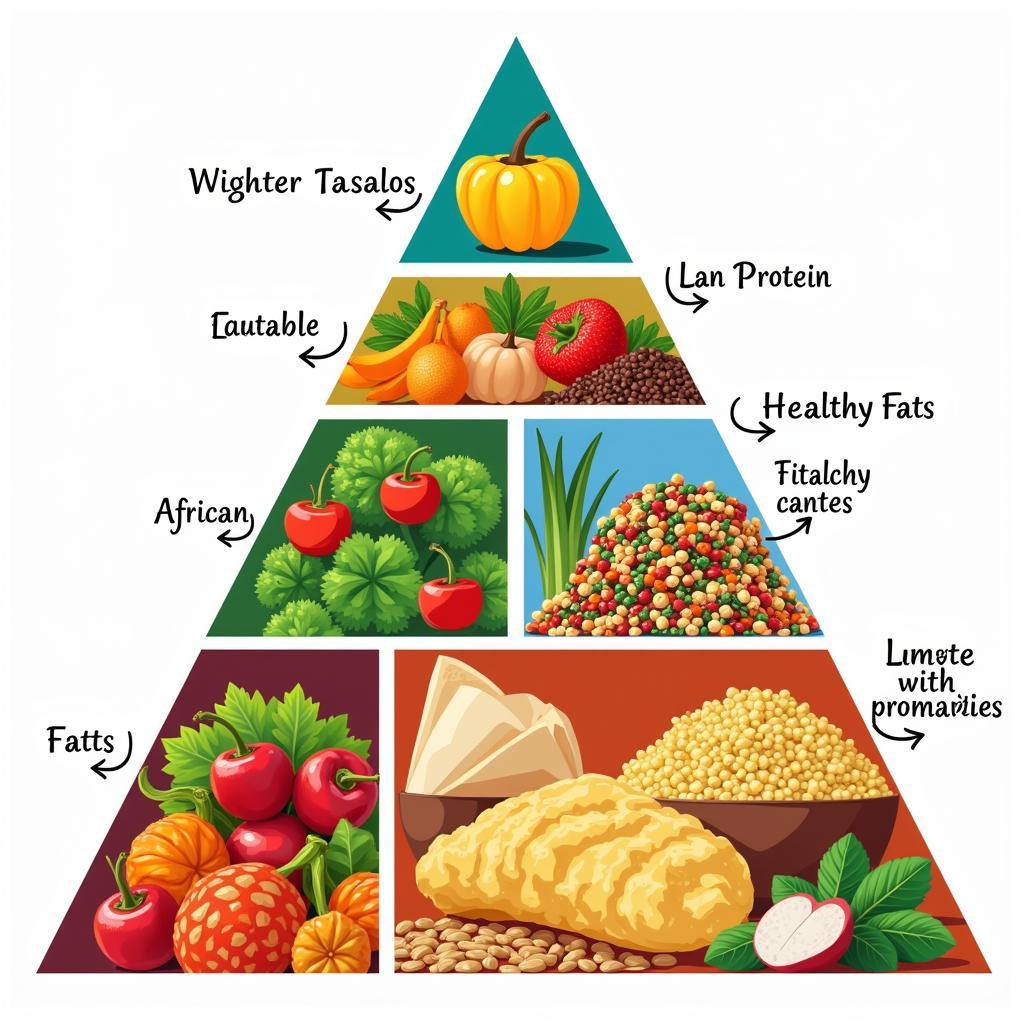Navigating African Food for Diabetes Patients
Managing diabetes through diet can feel like navigating a culinary minefield, especially when exploring the rich and diverse world of African cuisine. The good news is that African food, with its emphasis on fresh, whole ingredients and traditional cooking methods, offers a plethora of delicious and diabetes-friendly options. This article will delve into the heart of African cuisine, guiding you through ingredient choices, cooking techniques, and meal planning strategies to help you enjoy the vibrant flavors of Africa while keeping your blood sugar in check.
Understanding Diabetes and the Importance of Diet
Before we embark on our culinary journey, it’s essential to understand how food choices impact diabetes management. Diabetes affects the body’s ability to regulate blood sugar levels. Carbohydrates, found in starches, fruits, milk, and sweets, are the primary contributors to blood sugar spikes.
 African Food Pyramid for Diabetes Management
African Food Pyramid for Diabetes Management
The key to managing diabetes through diet is to choose foods that promote stable blood sugar levels and overall health. This involves:
- Controlling Carbohydrate Intake: Not all carbs are created equal. Opt for complex carbohydrates found in whole grains, legumes, and vegetables, which are digested slowly and have a less dramatic impact on blood sugar.
- Prioritizing Fiber: Fiber-rich foods, abundant in African cuisine, help regulate blood sugar levels by slowing down digestion and absorption of glucose.
- Choosing Lean Protein Sources: Protein plays a crucial role in blood sugar control and satiety. African cuisine offers a bounty of lean protein options, including fish, beans, lentils, and skinless poultry.
- Incorporating Healthy Fats: Unsaturated fats, found in avocados, nuts, seeds, and olive oil, are beneficial for heart health and can improve insulin sensitivity.
Exploring the African Food Basket: Ingredients for Diabetes Management
One of the most appealing aspects of African cuisine is its reliance on fresh, whole ingredients. Let’s explore some of the nutritional powerhouses that form the foundation of a diabetes-friendly African diet:
- Leafy Green Vegetables: From the beloved spinach-like amaranth to the slightly bitter jute leaves (ewedu), leafy greens are staples in many African dishes. They are packed with fiber, vitamins, and minerals, making them excellent for blood sugar regulation.
- Non-Starchy Vegetables: Okra, eggplant, tomatoes, onions, and peppers are just a few examples of the diverse non-starchy vegetables prevalent in African cooking. These vegetables are low in carbohydrates and calories while being rich in antioxidants and fiber.
- Legumes: Beans, lentils, and peas are nutritional powerhouses, offering a winning combination of protein, fiber, and complex carbohydrates. Incorporate them into stews, soups, or salads for a blood-sugar-friendly meal.
- Fish: Fish, particularly fatty varieties like salmon, mackerel, and sardines, are rich in omega-3 fatty acids, which can improve heart health and insulin sensitivity.
- Fruits: While fruits contain natural sugars, they are also rich in fiber and antioxidants. Enjoy fruits like berries, oranges, apples, and guava in moderation as part of a balanced diet.
Cooking the African Way: Techniques for Diabetes Management
Traditional African cooking methods often lend themselves well to a diabetic diet. Here are a few tips to keep in mind:
- Embrace Stewing and Soups: Stews and soups are cornerstones of African cuisine, allowing for a flavorful blend of vegetables, lean proteins, and legumes. Opt for broth-based versions and go easy on starchy root vegetables.
- Experiment with Spices: African cuisine is known for its bold and flavorful spice combinations. Spices like turmeric, ginger, garlic, and cinnamon not only add depth to dishes but also offer potential health benefits, including improved insulin sensitivity.
- Limit Added Fats and Sugars: While traditional African cooking doesn’t typically involve excessive amounts of added fats and sugars, it’s always a good idea to be mindful. Use healthy oils like olive oil or avocado oil sparingly and explore natural sweeteners like dates or honey in moderation.
 Harnessing the Power of African Spices for Diabetes Management
Harnessing the Power of African Spices for Diabetes Management
Meal Planning Made Easy: Sample African Dishes for Diabetes
Let’s translate these principles into practice with some delicious and diabetes-friendly African dishes:
Breakfast:
- Millet Porridge with Fruits and Nuts: Millet, a gluten-free grain, is a good source of fiber and magnesium. Top your porridge with berries, chopped nuts, and a sprinkle of cinnamon for a satisfying and blood-sugar-friendly breakfast.
- Plantain Frittata with Spinach and Tomatoes: This savory frittata combines the mild sweetness of plantains with protein-rich eggs, fiber-packed spinach, and antioxidant-rich tomatoes.
Lunch:
- Efo Riro (Nigerian Spinach Stew): This flavorful stew features leafy greens cooked with a blend of peppers, tomatoes, onions, and a touch of fish or meat for protein. Enjoy it with a small portion of brown rice or quinoa.
- Chicken Yassa (Senegalese Lemon Chicken): This tangy and flavorful dish features chicken marinated in lemon juice, onions, and spices, then grilled or baked to perfection. Pair it with a side of steamed vegetables or a small serving of couscous.
Dinner:
- Kenyan Bean Stew (Madondo): This hearty and flavorful stew is packed with protein and fiber from beans, vegetables like carrots and potatoes, and a coconut milk-based broth.
- Moroccan Tagine with Chicken and Vegetables: This slow-cooked dish features tender chicken and a medley of vegetables like carrots, zucchini, and chickpeas, infused with aromatic spices like ginger, cumin, and saffron.
Seeking Guidance: Your Path to Diabetic-Friendly African Cuisine
Navigating dietary changes with diabetes can be challenging, but it doesn’t mean giving up the foods you love. Embracing the fresh, whole ingredients and traditional cooking methods of African cuisine can be a delicious and empowering way to manage your blood sugar levels while enjoying the rich tapestry of flavors this continent has to offer.
Remember to consult with a healthcare professional or registered dietitian to create a personalized meal plan that aligns with your individual needs and health goals.
Frequently Asked Questions about African Food and Diabetes:
- Can I still enjoy fufu and other starchy staples?
While fufu and other starchy staples are enjoyed in many African cultures, they are high in carbohydrates and should be consumed in moderation. Opt for smaller portions and pair them with protein and non-starchy vegetable dishes to help balance blood sugar levels.
- Are there any African fruits I should avoid with diabetes?
As with all fruits, moderation is key. While most African fruits can be incorporated into a diabetic diet, it’s essential to be mindful of portion sizes. Fruits like mangoes, pineapples, and bananas are higher in sugar content than others.
- Are all African cooking oils suitable for a diabetic diet?
While palm oil is commonly used in some African cuisines, it’s high in saturated fat. Opt for healthier alternatives like olive oil, avocado oil, or coconut oil in moderation.
Continue Exploring African Life:
- Learn more about the social and cultural significance of food in African societies.
- Discover the diverse culinary traditions of different African countries.
- Find recipes and cooking tips to bring the flavors of Africa to your kitchen.
We’re here to support your journey of embracing healthy and delicious African cuisine. If you have any further questions or need assistance, please don’t hesitate to contact us.
Call: +255768904061
Email: [email protected]
Visit Us: Mbarali DC Mawindi, Kangaga, Tanzania.
Our dedicated customer care team is available 24/7 to assist you.


